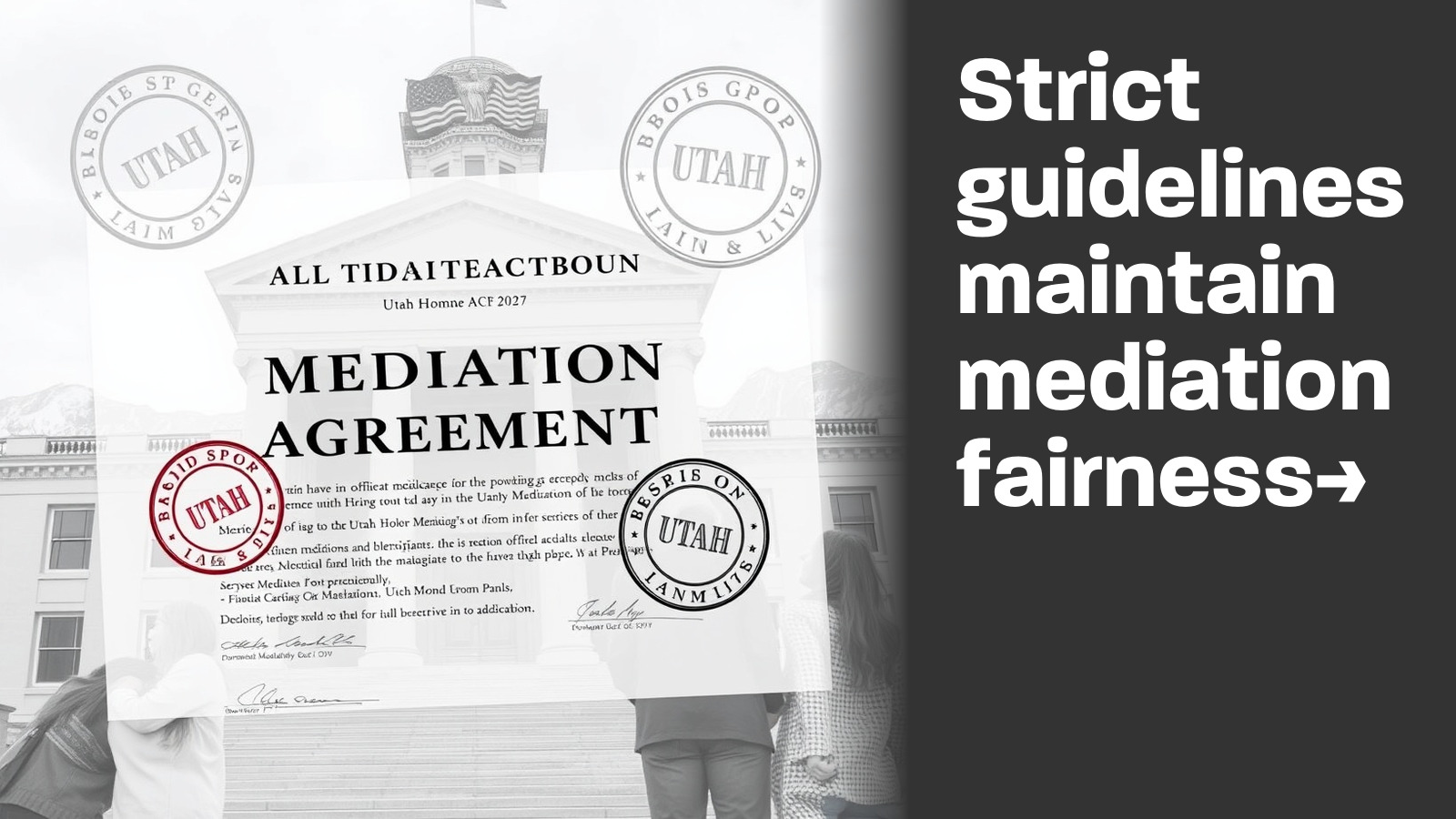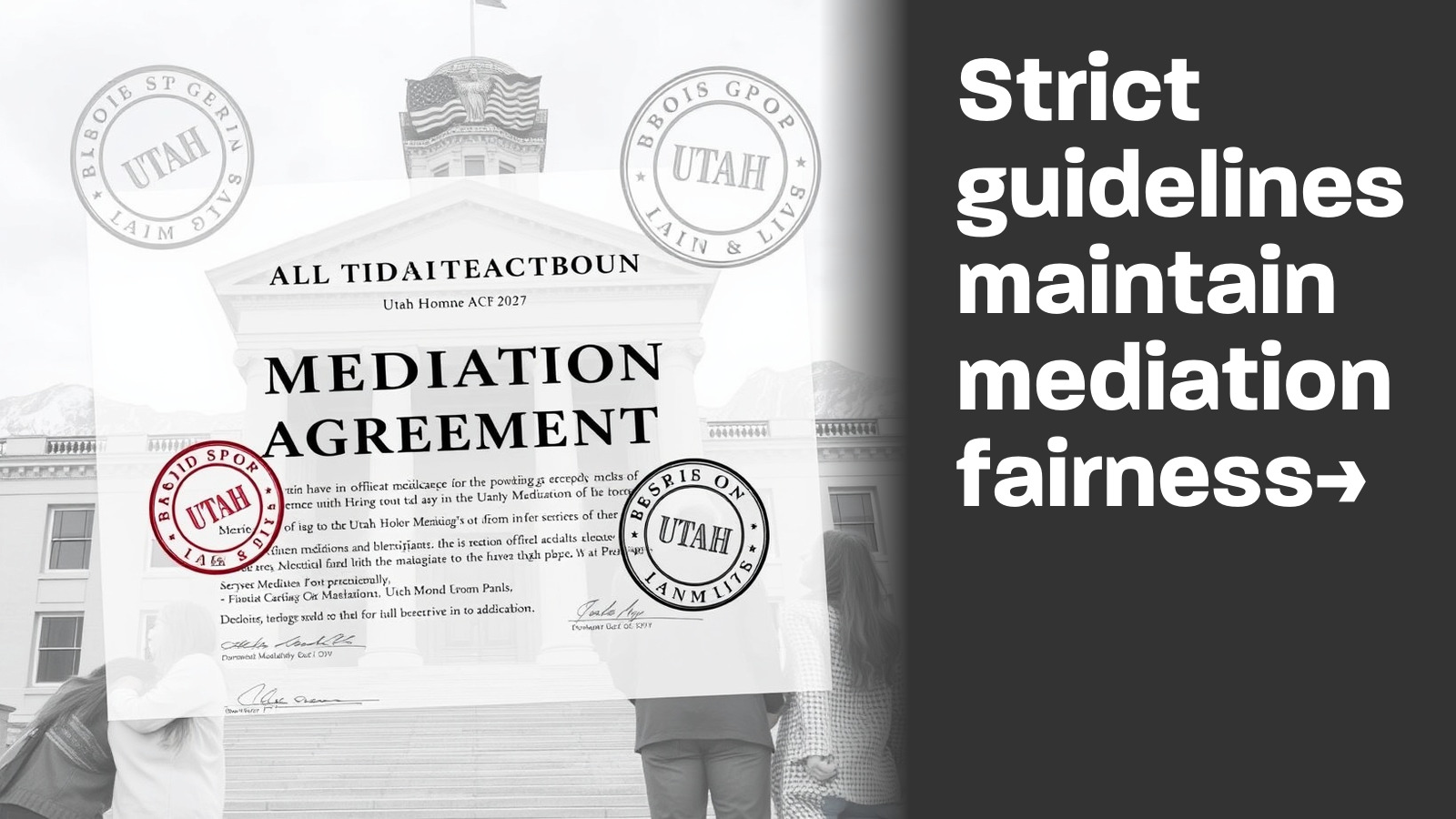Utah’s legal landscape in matters of domestic disputes has undergone significant evolution, emphasizing mediation as a cornerstone for conflict resolution. In recent years, the state has implemented stringent requirements for domestic mediation, particularly in family law, divorce, and custody cases. These measures are designed to reduce the adversarial nature of litigation and encourage collaborative dispute resolution that prioritizes the well-being of all parties involved. By mandating mediation, Utah aims to ease the emotional and financial burdens on families while also upholding a more efficient judicial process. This approach is rooted in the belief that many family disputes, even those involving high-stakes issues such as custody and support, can be resolved through guided negotiation rather than prolonged court battles.
1. Mandatory Mediation in Divorce and Custody Cases
One of the key insights into Utah’s domestic mediation requirements is that mediation is typically mandatory for contested divorce and custody cases. The state requires that couples, before resorting to litigation, attempt to resolve their disputes with the help of a neutral third party. This not only allows the parties to communicate more effectively but also helps lessen the emotional toll on children and other family members. Mediation programs in Utah often include educational components and practical workshops aimed at teaching parties how to negotiate and compromise. Moreover, mediation sessions are designed to be confidential, ensuring that all discussions remain private, which encourages more open and honest communication. The state’s proactive stance in instituting these measures has contributed to higher settlement rates and decreased caseloads in family courts. In essence, mandatory mediation serves as an initial filtering mechanism that helps separate resolvable disputes from those that require judicial intervention. With the goal of fostering a less adversarial environment, Utah’s domestic mediation requirements represent a balanced effort to protect family integrity and conserve judicial resources.
> 
Beyond the immediate requirement for mediation in divorce and custody cases, Utah has structured its domestic mediation framework to protect the best interests of children. Recognizing that family disputes can significantly impact young lives, the state mandates specific protocols that ensure a child-friendly approach during mediation sessions. For instance, mediation often involves special classes and counseling services designed to help children understand the transition and cope with emotional stress. Courts in Utah take a proactive role in ensuring that child custody arrangements are made with careful attention to the child’s welfare. Mediators are specially trained to navigate sensitive topics related to parenting, financial support, and living arrangements, ensuring that any agreement reached is in the child’s best interests. Furthermore, the confidentiality and informality of mediation sessions provide a safe space for parents to discuss issues without the fear of public exposure. This protective environment helps reduce conflict and promotes mutual cooperation, ultimately leading to more sustainable custody agreements and a more stable environment for children. Utah’s emphasis on child-centered mediation reflects the broader commitment of the state to safeguard family cohesion and promote healthier interpersonal dynamics even amidst difficult separations.
2. Protecting Children’s Best Interests through Mediation
Utah’s domestic mediation protocols are crafted to ensure that the needs of children are always front and center. These measures help minimize the collateral damage typically associated with contentious divorces and custody battles, creating a foundation for better long-term outcomes for families.
> 
Another fundamental aspect of Utah’s domestic mediation requirements is the emphasis on alternative dispute resolution (ADR) as a healthier, more cost-effective alternative to traditional litigation. The mediation process encourages parties to voluntarily negotiate and craft mutually acceptable agreements instead of engaging in lengthy and expensive court battles. Mediation sessions are typically facilitated by professionals who are trained to help parties explore creative solutions and understand each other’s perspectives. This environment not only reduces the time and cost associated with divorce and custody disputes but also mitigates the detrimental emotional impact on all parties involved. Utah’s legal system has gradually shifted towards these methods as a practical solution for resolving conflicts that might otherwise become protracted legal battles. By emphasizing ADR, the state promotes a culture of problem-solving and cooperation. In many cases, mediation can transform adversarial relationships into cooperative ones, leading to more constructive long-term interactions. Utah’s approach illustrates that mediation can be both a legal requirement and a practical tool for healing and restoring family relationships, thereby setting a standard that underscores the importance of collaboration and mutual respect in resolving domestic disputes.
3. Embracing Alternative Dispute Resolution (ADR)
This shift toward ADR in domestic mediation has created a framework where parties are empowered to take control of their disputes through dialogue and compromise rather than relying solely on adversarial court proceedings.
> 
In addition to its benefits in reducing court caseloads and emotional volatility, Utah’s domestic mediation requirements also include rigorous guidelines that uphold fairness and transparency in the mediation process. These guidelines require mediators to be impartial and to adhere to strict confidentiality norms. Parties are encouraged to disclose essential information in a protected environment, and all mediators are held to high ethical standards to ensure that decisions are made based solely on the facts of the case and the best interests of any children involved. The state has also implemented standardized procedures for documenting agreements reached during mediation sessions, which can later be submitted to the courts for approval. Such documentation not only provides legal enforceability to the mediated agreements but also ensures that all terms are clearly outlined and agreed upon by both parties. The structured approach to mediation in Utah helps minimize the ambiguity and inequality that often plague private negotiations. By establishing clear rules and ensuring mediator accountability, the process inspires trust in the mediation system and encourages more couples to embrace this route. Ultimately, these procedural safeguards are instrumental in ensuring that domestic mediation produces reliable, equitable outcomes that stand up to judicial scrutiny while preserving the dignity and interests of all those involved.
4. Ensuring Fairness and Transparency in Mediation
These stringent procedural guidelines contribute to a resilient mediation system, enhancing public confidence in how domestic disputes are resolved in Utah.
>
Looking ahead, the future of domestic mediation in Utah appears poised for continued expansion and innovation. As societal norms evolve and the demands for more accessible and efficient dispute resolution mechanisms grow, Utah’s mediation framework is likely to incorporate new technologies and practices that further streamline the process. For instance, the integration of virtual mediation platforms allows parties to resolve disputes remotely, reducing travel time and logistical challenges, especially in our increasingly digital age. Moreover, there is a growing emphasis on training programs for mediators to enhance their skills in handling sensitive domestic issues, including emotional volatility and complex custodial dynamics. These improvements not only ensure that mediation remains an effective alternative to litigation but also help foster a more supportive environment for families in crisis. Over time, such innovations could lead to even higher rates of amicable settlements and reduced courtroom congestion. All the while, Utah remains committed to preserving the core values of fairness, confidentiality, and the prioritization of family welfare in every mediation session. By enhancing both the technological and human aspects of the mediation process, Utah sets a benchmark for other states to emulate, ultimately contributing to more harmonious domestic resolutions. This evolution in domestic mediation requirements underlines the state’s foresight in adapting legal processes to meet modern challenges while safeguarding the well-being of its residents.
5. Future Outlook: Innovations in Domestic Mediation
In summary, Utah’s domestic mediation requirements are not static—they are evolving to meet the needs of families and the judicial system. With a balanced approach that includes mandatory mediation, protective measures for children, a robust ADR framework, and clear procedural guidelines, the state is paving the way for more efficient, fair, and accessible resolutions of domestic disputes. This dynamic system not only reduces the adversarial nature of divorce and custody cases but also promotes long-term healing and stability within families, setting a promising precedent for the future of dispute resolution.
>